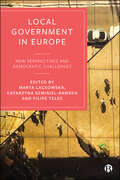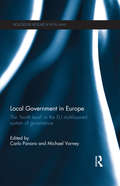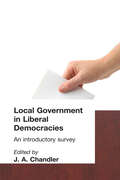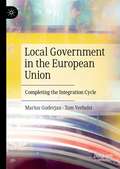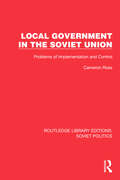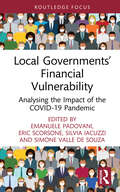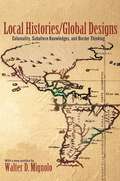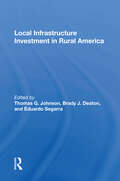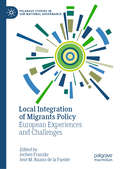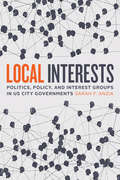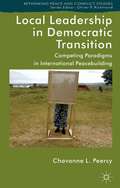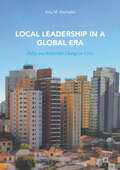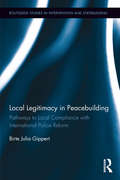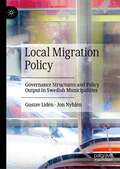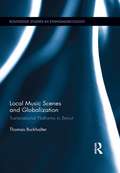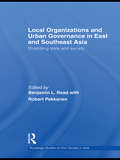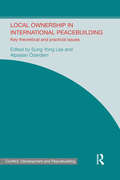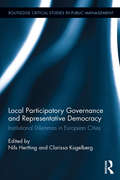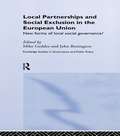- Table View
- List View
Local Government in Europe: New Perspectives and Democratic Challenges
by Marta Lackowska, Katarzyna Szmigiel-Rawska and Filipe TelesDrawing on classical and emerging research perspectives, this comprehensive book provides an up-to-date review of local government in Europe. Featuring an impressive range of contributors from both eastern and western Europe, the book addresses three main topics: territorial reforms, democratic empowerment of citizens and the role of local leadership, as well as new trends in local finances. Acknowledging their inherent diversity, the book examines the ways that local governments have responded to shared challenges, such as climate change, increasing populism and democratic deficit in order to identify both the variety and communalities between the country-specific features. In doing so, it provides a rich picture of the latest trends in local government, as well as pointing the way for future developments.
Local Government in Europe: The ‘Fourth Level’ in the EU Multi-Layered System of Governance (Routledge Research in EU Law)
by Carlo Panara Michael VarneyThis work considers the role of local government in 13 EU Member States (Austria, Belgium, Czech Republic, France, Germany, Greece, Hungary, Italy, Netherlands, Poland, Spain, Sweden and the United Kingdom. The book aims to provide an account of the system of local government in each of the countries studied along with a critical and contextual approach to the level of autonomy that local government enjoys. The approach is comparative, based on a questionnaire which all of the authors considered. There is then a detailed conclusion to the book which offers a detailed summary and comparative analysis of the responses in order to better consider the role of local authorities as the ‘fourth level’ of governance in the EU. The book aims to offer a detailed introduction to and account of each system of local government which may appeal to those seeking an overview of the area, but also a critical and contextual approach that will be of interest to those actively researching in the areas of local and regional government or EU-central-local government relations. The book contains details of reform in local government up to November 2012, including an analysis of the impact of austerity measures on local autonomy where these have become significant.
Local Government in Liberal Democracies: An Introductory Survey
by J. A. ChandlerThe quality and nature of local government varies widely between countries. This introductory text looks at the workings of local government in England and Wales, Germany, France, Ireland, Italy, Sweden, Canada and the USA. The chapters have a similar format so the student has a framework for systematic comparisons of the different case studies and a comprehensive conclusion summarises major differences and relationships between the structures studied.
Local Government in the European Union: Completing the Integration Cycle
by Marius Guderjan Tom VerhelstThis book addresses the ‘bigger picture’ of local-European relations and adds a new dimension to existing studies on multilevel governance and the Europeanisation of local government. Drawing from a combination of European integration theories and operational approaches, it introduces the idea of an integration cycle in which local government responds to the top-down impact of the EU internally, horizontally and vertically. This volume presents a wide range of empirical examples to demonstrate how local authorities across Europe have changed their practices, orientation and preferences, and adapted their institutions and organisation. Not only do cities, towns and counties cooperate with each other across borders and through transnational networks and partnerships, but by mobilising formally and informally, local actors participate in and influence European governance and contribute to the future trajectories of European integration, thereby completing the integration cycle.
Local Government in the Soviet Union: Problems of Implementation and Control (Routledge Library Editions: Soviet Politics)
by Cameron RossLocal Government in the Soviet Union (1987) analyses the Soviet Union’s limited success in improving local government between in the 1960s to 1980s, as the country made a drive toward centralized policy control. It examines the institutional framework and changes in crucial policy areas, and argues that a fragmented vertical power structure involving the three bureaucracies of Party, ministries and the city and regional soviets was unproductive. It shows how group interests moulded and adapted policies and how the Party’s initiative in centralizing policy was thwarted. It also outlines the significance of the industrial base in determining local budgets and the provision of amenities, as opposed to overtly political factors.
Local Government: Policy and Management in Local Authorities
by Howard ElcockSince first publication in 1982, Howard Elcock's Local Government has established a reputation as a comprehensive and unbiased account of how British local government really works. This respected textbook has been completely revised and rewritten for its third edition, to take account of changes in local government and in the circumstances in which it operates. The third edition examines new management structures and accountabilities that follow the policy initiatives of the central Conservative administration. It appraises the impact of the three-pronged reform of the Thatcher years: impact on local authorities' financial resources, new structures of local government and new pressure to contract services out to the private and voluntary sectors.
Local Governments’ Financial Vulnerability: Analysing the Impact of the Covid-19 Pandemic (Routledge Research in Urban Politics and Policy)
by Emanuele PadovaniLocal Governments’ Financial Vulnerability presents a conceptual framework developed to examine how vulnerable local finances were before and in the immediate aftermath of the Covid-19 pandemic crisis by mapping and systematising its dimensions and sources. The model is then applied to eight countries with different administrative models and traditions: Australia, Austria, Bosnia and Herzegovina, Germany, Italy, Portugal, Spain, and the USA. Comparative results reveal not only that Covid-19 impacts and policy tools had a lot of similarities across countries, but also that financial vulnerability has an inherently contingent nature in time and space and can lead to paradoxical outcomes. The book shows that the impact of the crisis on local governments’ finances has been postponed and that financial vulnerability is expected to increase dramatically for a few years following the pandemic, especially in larger and richer municipalities which are traditionally more autonomous and less financially vulnerable. The authors provide timely insights and analytical tools that can be useful for both academic and public policy purposes, to further appreciate local governments’ financial vulnerability, especially during crises. This book is a valuable resource for practitioners and academics, as well as students of public policy, public management, financial management, and public accounting. Local governments can use the framework to better appreciate and manage their financial vulnerability, while oversight authorities can use it to help local governments become less financially vulnerable or, at least, more aware of their financial vulnerability. Financial institutions, advisors, and rating agencies may use this publication to refine or revise their models of credit risk assessment.
Local Heroes: The Political Economy of Russian Regional Governance
by Kathryn Stoner-WeissIn Local Heroes, Kathryn Stoner-Weiss analyzes a crucial aspect of one of the great dramas of modern times--the reconstitution of the Russian polity and economy after more than seventy years of communist rule. This is the first book to look comprehensively and systematically at Russia's democratic transition at the local level. Its goal is to explain why some of the new political institutions in the Russian provinces weathered the monumental changes of the early 1990s better than others. Using newly available economic, political, and sociological data to test various theories of democratization and institutional performance, Stoner-Weiss finds that traditional theories are unable to explain variations in regional government performance in Russia. Local Heroes argues that the legacy of the former economic system influenced the operation of new political institutions in important and often unexpected ways. Past institutional structures, specifically the concentration of the regional economy, promoted the formation of political and economic coalitions within a new proto-democratic institutional framework. These coalitions have had positive effects on governmental performance. For democratic theorists, this may be a surprising conclusion. However, it is possible, as Stoner-Weiss suggests, that the needs of democratic development may be different in the short run than in the long run. The "local heroes" of today may be impediments to the further development of democracy tomorrow. This provocative work, solidly grounded in research and theory, will interest anyone concerned with issues of economic and political transition.
Local Histories/Global Designs: Coloniality, Subaltern Knowledges, and Border Thinking (Princeton Studies in Culture/Power/History)
by Walter D. MignoloLocal Histories/Global Designs is an extended argument about the "coloniality" of power by one of the most innovative Latin American and Latino scholars. In a shrinking world where sharp dichotomies, such as East/West and developing/developed, blur and shift, Walter Mignolo points to the inadequacy of current practices in the social sciences and area studies. He explores the crucial notion of "colonial difference" in the study of the modern colonial world and traces the emergence of an epistemic shift, which he calls "border thinking." Further, he expands the horizons of those debates already under way in postcolonial studies of Asia and Africa by dwelling in the genealogy of thoughts of South/Central America, the Caribbean, and Latino/as in the United States. His concept of "border gnosis," or sensing and knowing by dwelling in imperial/colonial borderlands, counters the tendency of occidentalist perspectives to manage, and thus limit, understanding. In a new preface that discusses Local Histories/Global Designs as a dialogue with Hegel's Philosophy of History, Mignolo connects his argument with the unfolding of history in the first decade of the twenty-first century.
Local Housing Market Cycle and Loss Given Default: Evidence from Sub-Prime Residential Mortgages
by Yanan Zhang Lu Ji Fei LiuA report from the International Monetary Fund.
Local Infrastructure Investment In Rural America
by Thomas G. Johnson Brady J. Deaton Eduardo SegarraOriginally published in 1988, this is a collection of symposium papers examining the link between public infrastructure and economic growth. Subjects covered include Economic theories of infrastructure Decision-making, Issues in the supply of Public infrastructure, Life cycle behaviour and the demand for infrastructure, limitations, financial sources and budgeting, the role of the local and federal government, different models and case studies in South Carolina, North Dakota, and the Pennsylvania Agricultural Access Program
Local Integration of Migrants Policy: European Experiences and Challenges (Palgrave Studies in Sub-National Governance)
by Jochen Franzke José M. Ruano de la FuenteThis book presents an overview of European migration policy and the various institutional arrangements within and between various actors, such as local councils, local media, local economies, and local civil society initiatives. Both the role of local authorities in this policy field and their cooperation with civil society initiatives or networks are under-explored topics for research. In response, this book provides a range of detailed case studies focusing on the six main groups of national and administrative traditions in Europe: Germanic, Scandinavian, Napoleonic, Southeastern European, Central-Eastern European and Anglo-Saxon.
Local Interests and American Foreign Policy: Why International Interventions Fail (Routledge Studies in US Foreign Policy)
by Karl SandstromThis book provides an alternative perspective on how social interest-groups form and interact to affect interventions. It combines historic, sociological and international relations perspectives in a framework through which to view the relevant socio-political dynamics in ‘target societies’. At a time when American foreign policy seeks to redefine its objectives and its methods of intervention, the monolithic ideological assumptions of the state as the panacea to all social ailments, both as a format and a vehicle of norm delivery, seemingly dooms American foreign policy and European allies, to the repetition of old mistakes. In environments where interests and priorities are shaped on a highly localised basis, interventionist agendas often lack relevant meaning. The book focuses in particular on the contrast between the assumptions inherent in ‘Western’ interventionist strategies and social interest formation in Afghanistan, Somaliland, and Somalia. Based on extensive fieldwork, the book draws on available literature and on interviews with local population or international aid and development workers. The conclusion is that in the cases examined, the agency of local interest groups largely controls the outcome of external strategies. This book will be of great interest to students and scholars of US Foreign Policy, International Relations and Security Studies.
Local Interests: Politics, Policy, and Interest Groups in US City Governments
by Sarah F. AnziaA policy-focused approach to understanding the role of interest groups in US municipal governments. Local politics in the United States once seemed tranquil compared to the divisiveness and dysfunction of the country’s national politics. Those days have passed. As multiple wide-ranging crises have thrust America’s local governments into the spotlight, they have also exposed policy failures and systemic problems that have mounted for years. While issues such as policing and the cost of housing are debated nationally, much of the policymaking surrounding these issues occurs locally. In Local Interests, Sarah F. Anzia explores how local governments—and the interest groups that try to influence them—create the policies that drive the national conversation: policing, economic development, housing, and challenges of taxing and spending. Anzia examines local interest groups in terms of the specific policies they pursue, including how these groups get active in politics and what impact they have. By offering new perspectives on these issues, Anzia contributes to our knowledge of how interest groups function and the significant role they play in shaping broader social outcomes.
Local Interests: Politics, Policy, and Interest Groups in US City Governments
by Sarah F. AnziaA policy-focused approach to understanding the role of interest groups in US municipal governments. Local politics in the United States once seemed tranquil compared to the divisiveness and dysfunction of the country’s national politics. Those days have passed. As multiple wide-ranging crises have thrust America’s local governments into the spotlight, they have also exposed policy failures and systemic problems that have mounted for years. While issues such as policing and the cost of housing are debated nationally, much of the policymaking surrounding these issues occurs locally. In Local Interests, Sarah F. Anzia explores how local governments—and the interest groups that try to influence them—create the policies that drive the national conversation: policing, economic development, housing, and challenges of taxing and spending. Anzia examines local interest groups in terms of the specific policies they pursue, including how these groups get active in politics and what impact they have. By offering new perspectives on these issues, Anzia contributes to our knowledge of how interest groups function and the significant role they play in shaping broader social outcomes.
Local Interests: Politics, Policy, and Interest Groups in US City Governments
by Sarah F. AnziaA policy-focused approach to understanding the role of interest groups in US municipal governments. Local politics in the United States once seemed tranquil compared to the divisiveness and dysfunction of the country’s national politics. Those days have passed. As multiple wide-ranging crises have thrust America’s local governments into the spotlight, they have also exposed policy failures and systemic problems that have mounted for years. While issues such as policing and the cost of housing are debated nationally, much of the policymaking surrounding these issues occurs locally. In Local Interests, Sarah F. Anzia explores how local governments—and the interest groups that try to influence them—create the policies that drive the national conversation: policing, economic development, housing, and challenges of taxing and spending. Anzia examines local interest groups in terms of the specific policies they pursue, including how these groups get active in politics and what impact they have. By offering new perspectives on these issues, Anzia contributes to our knowledge of how interest groups function and the significant role they play in shaping broader social outcomes.
Local Leadership in Democratic Transition
by Chavanne L. PeercySince the end of the Cold War, the United Nations has become increasingly involved in peacebuilding. However, the often questionable results have led to much mistrust of the methods employed by international organizations. The current transition paradigm assumes that local leaders which participate in the process will assist in the democratic transition and are themselves an output of the process. This assumption appears to be fundamentally wrong. This book examines whether the inclusion of non-democratic leadership in post-conflict transition induces democratic principles and sustainable peace, or if it in fact undermines the values which the international community attempts to promote and contribute towards the solidification of non-democratic regimes. Using an in-depth analysis of local leadership before, during and after democratic transition in three key case studies, namely Burundi, Cambodia and Liberia, the author provides a unique insight into the type of leadership required for transitioning a country to democracy. Delivering a new framework that assists scholars, policymakers and practitioners in understanding the roles of local leaders in democratic transition, it also includes recommendations for future peacebuilding operations.
Local Leadership in a Global Era
by Amy M. HochadelThis book examines local leadership and policy changes as a result of globalisation. The author identifies what behaviours are facilitating the connection of local economies to the global economy and what local structures enable or inhibit the activity. It presents positive indicators from empirical research and three local case studies, that a dyadic arrangement of transformational leadership and a legislative-activist structure are more likely to connect a local economy to opportunities in the global economy. Further, the research presents a new measure for behaviour and structure to deduce the potential for local participation in a global economy. The book is based in and expands several fields of study, and will appeal to scholars of international relations, economics, public management, immigration and politics.
Local Legitimacy in Peacebuilding: Pathways to Local Compliance with International Police Reform (Routledge Studies in Intervention and Statebuilding)
by Birte Julia GippertThis book analyses the role of legitimacy in explaining local actors’ compliance with international peacebuilding operations. The book provides a comparative, micro-level study of local actors’ reasons for compliance with or resistance to international peacebuilding. Specifically, it analyses three pathways to compliance –legitimacy, coercion, and reward-seeking – to explore local police officers’ compliance with the reforms stipulated by the EU Police Mission in Bosnia and the EU Rule of Law Mission in Kosovo. The work constructs a holistic framework of the mechanisms connecting each pathway to compliance and measures legitimacy using micro-level indicators. This study not only shines light on the question why local actors comply, a crucial factor in mission effectiveness, but it also illuminates exactly how compliance works. The book contributes nuanced evidence about the often-heralded importance of legitimacy in peacebuilding, showing exactly in which situations local legitimacy matters and in which it does not. It is also highly relevant for policy-makers as it unpacks and explains the mechanisms behind local legitimacy, assisting in understanding this usually nebulous concept. This book demonstrates the need for micro-level analysis by revealing the relevant processes of legitimation usually hidden behind commonly perceived social fault lines, such as the Serb-Albanian divide in Kosovo. This book will be of much interest to students of peacebuilding, war and conflict studies, Balkans politics, security studies and International Relations.
Local Migration Policy: Governance Structures and Policy Output in Swedish Municipalities
by Gustav Lidén Jon NyhlénThis book examines local migration policy in Sweden in light of the European migrant crisis. The novel approach of this volume covers both local governments’ policies on admission of immigrants and their efforts for enhancing social integration. The focus is on the division of responsibilities between political levels, examined through theories encompassing both governance structures and output and outcomes of policy. Sweden is a rare example where migration policy has undergone massive changes in the last decade. During the crisis, the country received some of the largest flows of immigrants in relation to its population compared with other European countries. Drawing from statistical material, case studies and a rich body of interviews, this innovative work provides a valuable resource that aspires to investigate the significance of the local level of government in migration policy. The objective is to reach general conclusions that go beyond the realms of the empirical focus.
Local Music Scenes and Globalization: Transnational Platforms in Beirut (Routledge Studies in Ethnomusicology)
by Thomas BurkhalterThis book offers the first in-depth study of experimental and popular music scenes in Beirut, looking at musicians working towards a new understanding of musical creativity and music culture in a country that is dominated by mass-mediated pop music, and propaganda. Burkhalter studies the generation of musicians born at the beginning of the Civil War in the Lebanese capital, an urban and cosmopolitan center with a long tradition of cultural activities and exchanges with the Arab world, Europe, the US, and the former Soviet Union. These Lebanese rappers, rockers, death-metal, jazz, and electro-acoustic musicians and free improvisers choose local and transnational forms to express their connection to the broader musical, cultural, social, and political environment. Burkhalter explores how these musicians organize their own small concerts for ‘insider’ audiences, set up music labels, and network with like-minded musicians in Europe, the US, and the Arab world. Several key tracks are analyzed with methods from ethnomusicology, and popular music studies, and contextualized through interviews with the musicians. Discussing key references from belly dance culture (1960s), psychedelic rock in Beirut (1970s), the noises of the Lebanese Civil war (1975-1990), and transnational Pop-Avant-Gardes and World Music 2.0 networks, this book contributes to the study of localization and globalization processes in music in an increasingly digitalized and transnational world. At the core, this music from Beirut challenges "ethnocentric" perceptions of "locality" in music. It attacks both "Orientalist" readings of the Arab world, the Middle East, and Lebanon, and the focus on musical "difference" in Euro-American music and culture markets. On theoretical grounds, this music is a small, but passionate attempt to re-shape the world into a place where "modernity" is not "euro-modernity" or "euro-american modernity," but where possible new configurations of modernity exist next to each other.
Local Organizations and Urban Governance in East and Southeast Asia: Straddling state and society (Routledge Studies on Civil Society in Asia)
by Benjamin L. Read Robert PekkanenThis edited collection brings together enterprising pieces of new research on the many forms of organization in East and Southeast Asia that are sponsored or mandated by government, but engage widespread participation at the grassroots level. Straddling the state-society divide, these organizations play important roles in society and politics, yet remain only dimly understood. This book shines a spotlight on this phenomenon, which speaks to fundamental questions about how such societies choose to organize themselves, how institutions of local governance change over time, and how individuals respond to and make use of the power of the state. The contributors investigate organizations ranging from volunteer-based organizations that partner with government in providing services for homeless children, to state-managed networks of neighborhood- or village-level associations that perform representative as well as administrative functions and seeks to answer a number of questions: When do the "vertical," top-down imperatives of the state stifle "horizontal" solidarities, and when might the two work in harmony? Are useful social and administrative purposes served by this type of fusion? Does it amplify or merely muffle citizens’ voices? What does it tell us about existing accounts of community, social capital, "synergy," "complementarity," "subsidiarity," and related concepts? Representing seven countries: China, Japan, Vietnam, Thailand, Indonesia, Taiwan, and Singapore this volume will be of interest to undergraduates, postgraduates and academics in Asian studies, political science, sociology, anthropology, development, history, nonprofit studies.
Local Ownership in International Peacebuilding: Key Theoretical and Practical Issues (Studies in Conflict, Development and Peacebuilding)
by Alpaslan Özerdem Sung Yong LeeThis edited volume empirically examines key theoretical and practical issues relevant to the promotion of local ownership in contemporary international peacebuilding. This book attempts to provide comprehensive understanding of the issue of local ownership in international peacebuilding. By providing an empirical analysis of nine case studies, the volume aims to supplement contemporary academic discussions on local ownership, which have thus far mainly focused on its normative or theoretical dimensions. The case studies included here examine the peace operations in a wide range of countries - Afghanistan, Bosnia-Herzegovina, Cambodia, Cyprus, Kenya, Uganda, Sierra Leone, South Sudan, and Sri Lanka. The book seeks to address the weaknesses of conventional studies by:,empirical review of the achievements and limitations of previous attempts to promote local ownership; examination of the key concepts of local ownership; and analysis of structural and practical challenges. The volume concludes by presenting practical proposals for addressing the limitations of contemporary local ownership promotion. Through these means, the book aims to explore a key research question from both theoretical and empirical perspectives: How can international peacebuilding facilitate effective, active local community participation? This volume will be of much interest to students of peacebuilding, development studies, global governance, peace and conflict studies, security studies and IR.
Local Participatory Governance and Representative Democracy: Institutional Dilemmas in European Cities (Routledge Critical Studies in Public Management)
by Nils Hertting Clarissa KugelbergOver the past few decades and throughout the world, numerous government-initiated experiments and attempts at directly engaging and including citizens have emerged as remedies for a variety of problems faced by modern democracies, including political disaffection and insufficient capacity to deal with the complexity inherent in many contemporary public problems, such as climate change and segregation. In practice, these attempts are given many names, such as citizen panels, deliberative fora, collaborative dialogues, etc. In the academic literature as well, the phenomenon falls under many different headings, for instance collaborative, deliberative or interactive governance. Participatory Governance and Representative Democracy refers to this empirical phenomenon as local participatory governance, that is, government-sponsored direct participation between invited citizens and local officials in concrete arrangements and concerning problems that affect them. Participatory governance, we argue, may take many forms, regarding (1) type of interaction and type of communication between participants within the specific participatory arrangement (e.g., deliberative vs. aggregative) as well as regarding (2) the relation and connection between the specific arrangement and the more traditional representative structures (e.g., compatible, incompatible, transformative or irrelevant). The proposed edited volume addresses the matter of institutionalization, highlighting the difficulties associated with establishing stability and a shared understanding of the roles and rules among citizens, local politicians and administrators in participatory arrangements.
Local Partnership and Social Exclusion in the European Union: New Forms of Local Social Governance? (Routledge Studies in Governance and Public Policy #Vol. 5)
by John Benington Mike GeddesThis book explores local partnership-based initiatives to tackle European-wide problems of poverty and social exclusion. A major comparative study of the fast developing theme of social exclusion, the contributors look at its causes, effects and at the ways it might be combatted. Based on in-depth, cross-national research from areas across Europe it provides a uniquely authoritative account of the complexities of policy development in the EU, and will be invaluable to researchers in European studies, politics, and economics.
